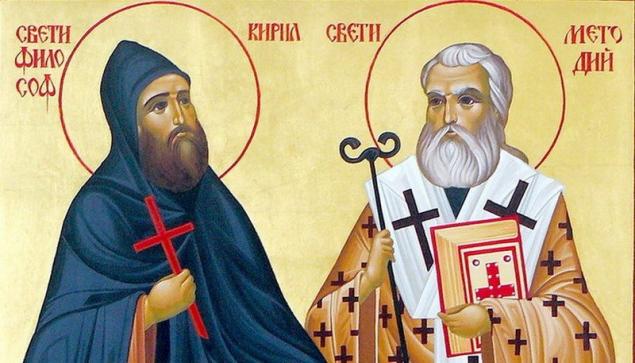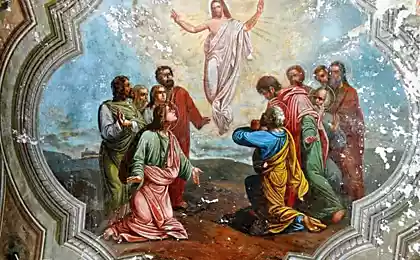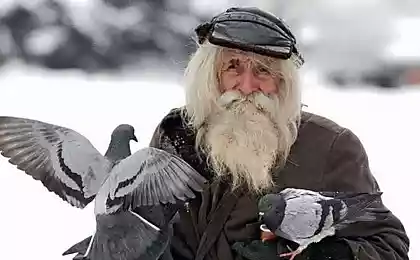270
Traditions on the Day of Cyril and Methodius
Today, May 24, is the day of remembrance of Saints Cyril and Methodius, the fathers of Slavic writing. This is the only church-state holiday. Today, the Day of Slavic Writing and Culture is also celebrated. From time immemorial, this day was a great holiday and revered among the people.

Today's edition. "Site" He will tell you about the lives of the saints and how to spend this day.
Saints Cyril and Methodius Brothers Cyril and Methodius They were born in Macedonia, in the city of Soluna. Methodius was the eldest of the children, and Constantine (in monasticism Cyril) the youngest. They were raised in a wealthy family, their father was a military commander in the Greek army. Therefore, Methodius initially followed in the footsteps of his father and began military service.
By his zeal he secured the favour of the tsar and was appointed voivode to Slavinia, one of the Slavic principalities under Greek rule. There he became acquainted with the Slavic language and studied it, which helped him later become a spiritual teacher and pastor of the Slavs. After 10 years of military career, Methodius decided to renounce the fuss and became a monk.

Constantine from childhood showed a talent for science. He studied in Constantinople and received a good education there. The younger brother studied literature, philosophy, mathematics, astronomy and music. However, he was most interested in theology. After teaching, he went to his brother Methodius and for several years was a monk in a monastery on Olympus. There he began to learn the Slavic language.

After some time, by decree of the emperor, the brothers were sent to preach the Gospel to the Khazars. During the trip, they stopped at Korsuni, where, thanks to Cyril, the relics of St. Clement, Pope of Rome, were found and raised from the seabed. Moreover, while in Korsuni, Saint Cyril found the Gospel and the Psalter, which were written in “Russian letters.”
Soon the brothers began a great work: with prayer and fasting they worked on the creation of the Slavic alphabet. Eventually they translated the Gospel and the Psalm from Greek into Slavic. After the completion of this great work, the holy brothers went to Moravia, where they began training in the Slavic language.

But not everyone was happy about it. The German bishops were particularly angry, arguing that God should be glorified only in Hebrew, Greek or Latin. They sent a complaint against the brothers to Rome, and even a trial of the perpetrators was ordered. The saints took with them the relics of St. Clement of Rome and went to Rome.
Upon their arrival, they learned that the emperor had already died and that Hadrian II had succeeded him. When the Pope learned that the saints had brought with them the relics of Clement, the brothers solemnly received and confirmed the service in the Slavic language. The books they translated were consecrated and ordered to celebrate the liturgy in Roman churches and in the Slavic language.

In Rome, Cyril had a vision of his death. Then he accepted the schema and 50 days later, at the age of 42, died. After the death of his brother, Saint Methodius did not stop his educational work. With the help of his disciples, he translated the Old Testament, Nomocanon and patristic books into Slavic. Saint Methodius died at the age of 60. It was sung in Slavic, Greek and Latin.
The activities of Saints Cyril and Methodius influenced the development of the Old Russian language. That is why we celebrate dayDay of Slavic literature and culture. People still remember the holy brothers and honor their memory.

People often ask what to ask the saints. Remember that icons do not specialize in specific requests. It is best to pray to the Lord, believing in the power of God. However, Saints Cyril and Methodius can be asked for help in their studies, for the preservation of the true faith and for protection from false teachings.
Those who have children who are learning, you can ask the saints for success in their studies and help for their child. The most important thing is to pray sincerely, and the saints will help.

In the people today is called Mokiy wet in honor of the Great Martyr Mokiy of Amphipolis. On this day determined the weather for the whole summer. In the morning we watched the sunrise and watched the weather. It is believed that the weather on this day can make a forecast for the whole summer.
It was customary to hang a rag in the yard, and if it became wet, then the summer foreshadowed rainy, if it remained dry - the summer would be hot and dry. It is impossible to work in the field and in the garden on this day so that the hail does not beat the harvest. Young girls on Mokiy also did not work, they wove wreaths and guessed about future spouses.

Marks on Mokia.
These are the signs by which you can guess the weather for the whole summer. What's the weather like in town? What summer are the signs for you? Tell me in the comments.
Soon believers will celebrate another great holiday – the Trinity. Find out what not to do on this day.
There are many important holidays ahead. To avoid missing any of them, take a look at the most detailed Orthodox calendar for 2019.

Today's edition. "Site" He will tell you about the lives of the saints and how to spend this day.
Saints Cyril and Methodius Brothers Cyril and Methodius They were born in Macedonia, in the city of Soluna. Methodius was the eldest of the children, and Constantine (in monasticism Cyril) the youngest. They were raised in a wealthy family, their father was a military commander in the Greek army. Therefore, Methodius initially followed in the footsteps of his father and began military service.
By his zeal he secured the favour of the tsar and was appointed voivode to Slavinia, one of the Slavic principalities under Greek rule. There he became acquainted with the Slavic language and studied it, which helped him later become a spiritual teacher and pastor of the Slavs. After 10 years of military career, Methodius decided to renounce the fuss and became a monk.

Constantine from childhood showed a talent for science. He studied in Constantinople and received a good education there. The younger brother studied literature, philosophy, mathematics, astronomy and music. However, he was most interested in theology. After teaching, he went to his brother Methodius and for several years was a monk in a monastery on Olympus. There he began to learn the Slavic language.

After some time, by decree of the emperor, the brothers were sent to preach the Gospel to the Khazars. During the trip, they stopped at Korsuni, where, thanks to Cyril, the relics of St. Clement, Pope of Rome, were found and raised from the seabed. Moreover, while in Korsuni, Saint Cyril found the Gospel and the Psalter, which were written in “Russian letters.”
Soon the brothers began a great work: with prayer and fasting they worked on the creation of the Slavic alphabet. Eventually they translated the Gospel and the Psalm from Greek into Slavic. After the completion of this great work, the holy brothers went to Moravia, where they began training in the Slavic language.

But not everyone was happy about it. The German bishops were particularly angry, arguing that God should be glorified only in Hebrew, Greek or Latin. They sent a complaint against the brothers to Rome, and even a trial of the perpetrators was ordered. The saints took with them the relics of St. Clement of Rome and went to Rome.
Upon their arrival, they learned that the emperor had already died and that Hadrian II had succeeded him. When the Pope learned that the saints had brought with them the relics of Clement, the brothers solemnly received and confirmed the service in the Slavic language. The books they translated were consecrated and ordered to celebrate the liturgy in Roman churches and in the Slavic language.

In Rome, Cyril had a vision of his death. Then he accepted the schema and 50 days later, at the age of 42, died. After the death of his brother, Saint Methodius did not stop his educational work. With the help of his disciples, he translated the Old Testament, Nomocanon and patristic books into Slavic. Saint Methodius died at the age of 60. It was sung in Slavic, Greek and Latin.
The activities of Saints Cyril and Methodius influenced the development of the Old Russian language. That is why we celebrate dayDay of Slavic literature and culture. People still remember the holy brothers and honor their memory.

People often ask what to ask the saints. Remember that icons do not specialize in specific requests. It is best to pray to the Lord, believing in the power of God. However, Saints Cyril and Methodius can be asked for help in their studies, for the preservation of the true faith and for protection from false teachings.
Those who have children who are learning, you can ask the saints for success in their studies and help for their child. The most important thing is to pray sincerely, and the saints will help.

In the people today is called Mokiy wet in honor of the Great Martyr Mokiy of Amphipolis. On this day determined the weather for the whole summer. In the morning we watched the sunrise and watched the weather. It is believed that the weather on this day can make a forecast for the whole summer.
It was customary to hang a rag in the yard, and if it became wet, then the summer foreshadowed rainy, if it remained dry - the summer would be hot and dry. It is impossible to work in the field and in the garden on this day so that the hail does not beat the harvest. Young girls on Mokiy also did not work, they wove wreaths and guessed about future spouses.

Marks on Mokia.
- If Mokia is wet, the summer will be wet.
- If the sunrise is purple and in the morning there is fog, the summer will be stormy.
- The fog on Mokia is for a rainy summer.
- If it rains on that day, the next forty days will also be rainy.

These are the signs by which you can guess the weather for the whole summer. What's the weather like in town? What summer are the signs for you? Tell me in the comments.
Soon believers will celebrate another great holiday – the Trinity. Find out what not to do on this day.
There are many important holidays ahead. To avoid missing any of them, take a look at the most detailed Orthodox calendar for 2019.
























